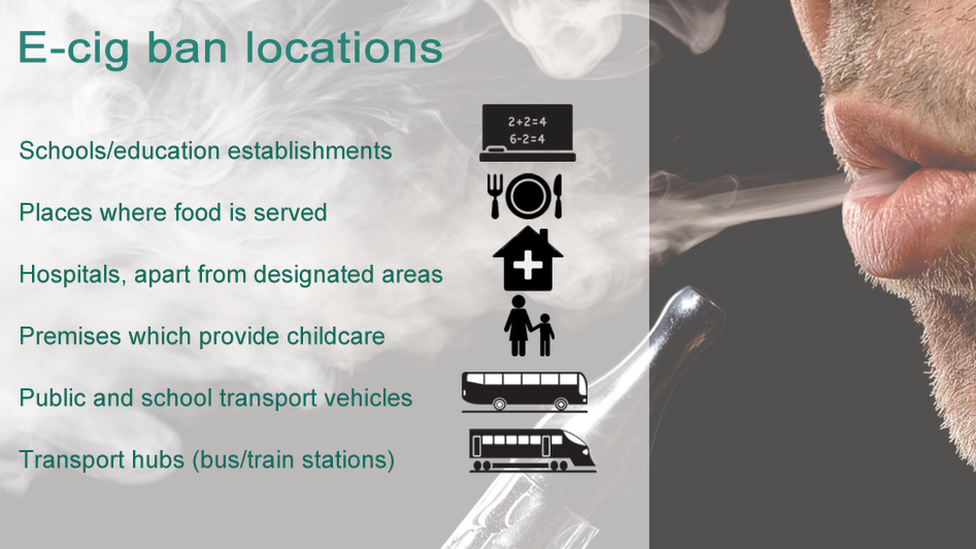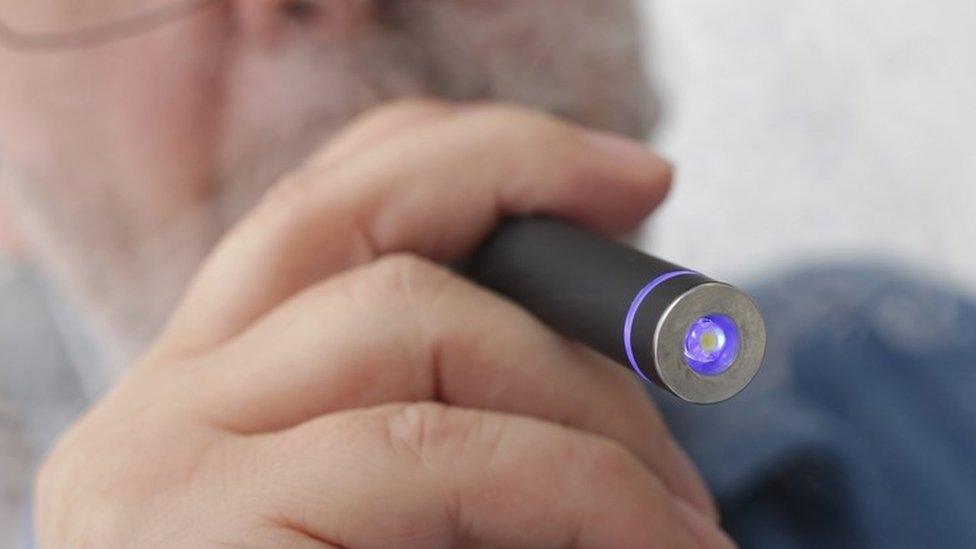First minister dismisses e-cigs ban plan in health bill
- Published
There is "no point running into a brick wall", says Carwyn Jones
Plans to ban e-cigarettes in some public places will be dropped from Wales' public health bill, the first minister has said.
It failed to pass on the last day of the previous assembly after opposition from Plaid Cymru.
Carwyn Jones told BBC Radio Wales' Sunday Supplement the bill would be tabled again without the e-cigs ban.
He said Labour's minority government would also have to rethink its council shake-up plans to win wider support.
"There is no point trying to bang our heads against a brick wall when it comes to e-cigs," he said.
"The public health bill will be brought back to the assembly but, clearly, there is no point including the provisions on e-cigs when we know they are not going to get through."

Stubbed out: The e-cig ban was drawn up to stop their use in a number of public areas
His comments come at the start of a new assembly term with the minority government requiring support from other parties to pass through plans.
Tobacco control action group ASH Wales has welcomed the minister's decision. Chief executive Suzanne Cass said: "The evidence shows that e-cigs are being used as a cessation tool by a significant number of ex-smokers."
The Public Health (Wales) Bill, external failed to pass at the last assembly after the presiding officer was required, because of a tie, to also vote, bringing the vote to 27 AMs against and 26 for.
As well as the e-cigarette measure, it aimed to create a compulsory licensing system for tattooists, prohibit intimate piercing of children under 16 and require councils to produce a local toilets strategy.
Welsh Conservative leader Andrew RT Davies said he was "delighted that Labour has been forced to admit that they won't be pursuing this misguided policy".
The failed vote came despite AMs previously backing revised e-cigarette plans.
Leanne Wood, leader of the opposition, on the 'danger' for an 'intransigent' government
On local government reorganisation plans, the first minister admitted he would now need to find "common ground" with the other political parties in the Senedd.
Labour has long hoped to cut the number of authorities from 22 to single figures which has been opposed by the Conservatives among others.
He said: "Clearly, the map we published before the election, that is not going to gain support across the assembly, that's obvious.
"But we do need to find a way forward."
Meanwhile, he was adamant that a preferred option for a new M4 relief road south of Newport, known as the black route, was the only way forward.
However, Plaid Cymru leader Leanne Wood has previously ruled out any kind of deal with Labour if it pushed the proposals forward.
Speaking on BBC Wales' Sunday Politics, Ms Wood said: "Danger faces the government if it continues to be intransigent".
She said it will need the backing of another party to get policies passed, adding that Plaid Cymru's 12 AMs would "consider very carefully what we do with our votes".

Analysis by political reporter Arwyn Jones
Carwyn Jones said he was just reflecting the arithmetic of the assembly in accepting that there wouldn't be enough support to push ahead with a ban on e-cigs in Wales and cutting the number of councils.
Having Kirsty Williams in the cabinet helps him with the numbers but the first minister has to choose his battles because he needs support from the opposition in order to get his policies, and budgets, through a vote in the Senedd.
Mr Jones says he won't budge on the M4 relief road, which means there's a real stalemate between him and Plaid Cymru. He wants their support on the budget, so it seems something will have to give.
Another tricky situation for Mr Jones is the agreement with Plaid Cymru which paved the way for him to be re-appointed as first minister.
Today we've seen how little detail there was in the agreement. Plaid want more doctors and a big commission to look at infrastructure. Carwyn Jones seemed cool on the idea of the latter, and unclear what Plaid wanted on the former.
With so little detail in the deal, I asked Leanne Wood if she had been conned by the first minister to get into power. Her answer: "I don't think so." If she starts to think otherwise, Carwyn Jones could find life difficult in the Senedd if the only other left-leaning party refuses to work with him.
- Published16 March 2016

- Published8 March 2016
